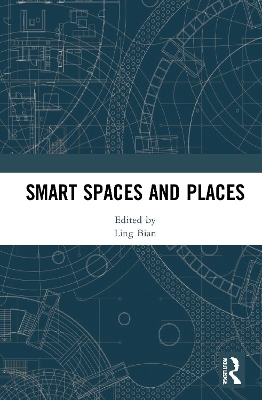
Smart Spaces and Places
Routledge (Verlag)
978-0-367-70354-7 (ISBN)
Smart technologies have advanced rapidly throughout our society (e.g. smart energy, smart health, smart living, smart cities, smart environment, and smart society) and across geographic spaces and places. Behind these "smart" developments are a number of seminal drivers, such as social media (e.g. Twitter), sensors (drones, wearables), smartphone apps, and computing infrastructure (e.g. cloud computing). These developments have captured the enthusiasm of the public, while inevitably present unprecedented challenges and opportunities for the geographic research community. When meeting the smart challenges, are there emerging theories, methods, and observations that reveal new spatial phenomena, produce new knowledge, and foster new policies?
Smart Spaces and Places addresses questions such as how to make spaces and places "smart", how the "smartness" affects the way we think spaces and places, and what role geographies play in knowledge production and decision-making in a "smart" era. The collection of 21 chapters offers stimulating discussion over the meaning of spaces, places, and smartness; scientific insights into smartness; social-political views of smartness; and policy implications of smartness.
The chapters in this book were originally published as a special issue of Annals of the American Association of Geographers.
Ling Bian is Professor in the Department of Geography at the University at Buffalo, State University of New York, USA. Her current research interests include the conceptual frameworks to represent spatially dynamic phenomena, individual-based and spatially explicit epidemiological modeling, and network analytics.
Introduction: Smart Spaces and Places
Ling Bian
Spaces, Places, and Smartness
1. Understanding the New Human Dynamics in Smart Spaces and Places: Toward a Splatial Framework
Shih-Lung Shaw and Daniel Sui
2. Being Smarter about Space: Drawing Lessons from Spatial Science
Ate Poorthuis and Matthew Zook
3. Smart Festivals? Security and Freedom for Well-Being in Urban Smart Spaces
Jeremy W. Crampton, Kara C. Hoover, Harrison Smith, Steve Graham and J. Colette Berbesque
4. Powers of Division: "Smart" Spaces as Controlling Workplace Activity Fragmentation
Jonathan Stiles and Clinton Andrews
5. Smart Spaces, Information Processing, and the Question of Intelligence
Casey R. Lynch and Vincent J. Del Casino Jr.
6. Exploding the Phone Book: Spatial Data Arbitrage in the 1990s Internet Boom
Will B. Payne and David O’Sullivan
Analytical Smartness
7. Rethinking Spatial Tessellation in an Era of the Smart City
Jin Xing, Renee Sieber and Stéphane Roche
8. Understanding Place Characteristics in Geographic Contexts through Graph Convolutional Neural Networks
Di Zhu, Fan Zhang, Shengyin Wang, Yaoli Wang, Ximeng Cheng, Zhou Huang and Yu Liu
9. Spatial Learning in Smart Applications: Enhancing Spatial Awareness through Visualized Off-Screen Landmarks on Mobile Devices
Rui Li
10. Assessing Mobility-Based Real-Time Air Pollution Exposure in Space and Time Using Smart Sensors and GPS Trajectories in Beijing
Jing Ma, Yinhua Tao, Mei-Po Kwan and Yanwei Chai
11. Individual Vacant House Detection in Very-High-Resolution Remote Sensing Images
Shengyuan Zou and Le Wang
12. The Missing Parts from Social Media–Enabled Smart Cities: Who, Where, When, and What?
Yihong Yuan, Yongmei Lu, T. Edwin Chow, Chao Ye, Abdullatif Alyaqout and Yu Liu
Critical Smartness
13. The Smart City Conundrum for Social Justice: Youth Perspectives on Digital Technologies and Urban Transformations
Michele Masucci, Hamil Pearsall and Alan Wiig
14. "Smart" Discourses, the Limits of Representation, and New Regimes of Spatial Data
Craig Dalton, Clancy Wilmott, Emma Fraser and Jim Thatcher
15. Technology as Ideology in Urban Governance
Luis F. Alvarez León and Jovanna Rosen
16. Civic Infrastructure and the Appropriation of the Corporate Smart City
Sung-Yueh Perng and Sophia Maalsen
17. How Smart Cities Became the Urban Norm: Power and Knowledge in New Songdo City
Glen David Kuecker and Kris Hartley
Smart Sustainability and Policy
18. The Struggles of Smart Energy Places: Regulatory Lock-In and the Swedish Electricity Market
Darcy Parks and Anna Wallsten
19. Toward Smart Foodsheds: Using Stakeholder Engagement to Improve Informatics Frameworks for Regional Food Systems
Allan D. Hollander, Casey Hoy, Patrick R. Huber, Ayaz Hyder, Matthew C. Lange, Angela Blatt, James F. Quinn, Courtney M. Riggle and Thomas P. Tomich
20. Smart Transportation for All? A Typology of Recent U.S. Smart Transportation Projects in Midsized Cities
Scott B. Kelley, Bradley W. Lane, Benjamin W. Stanley, Kevin Kane, Eric Nielsen and Scotty Strachan
21. Challenges and Opportunities for Coping with the Smart Divide in Rural America
Ruopu Li, Kang Chen and Di Wu
| Erscheinungsdatum | 23.06.2021 |
|---|---|
| Verlagsort | London |
| Sprache | englisch |
| Maße | 210 x 280 mm |
| Gewicht | 821 g |
| Themenwelt | Naturwissenschaften ► Geowissenschaften ► Geografie / Kartografie |
| ISBN-10 | 0-367-70354-8 / 0367703548 |
| ISBN-13 | 978-0-367-70354-7 / 9780367703547 |
| Zustand | Neuware |
| Haben Sie eine Frage zum Produkt? |
aus dem Bereich


